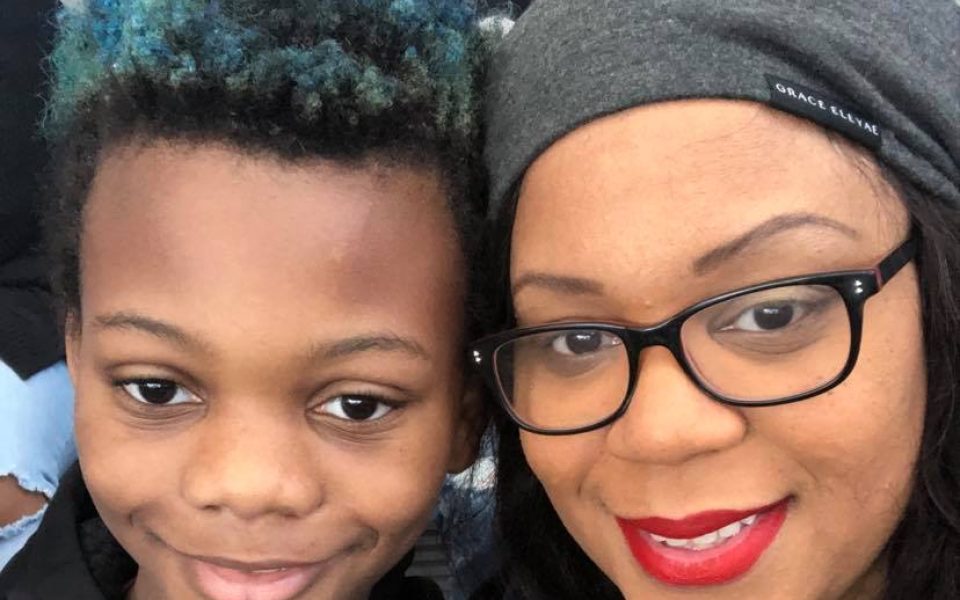Featured photo: Natasha Smith and her son, Nathaniel, say that getting the vaccine is giving them peace of mind. (courtesy photo)
Now that she’s been vaccinated against COVID-19, 17-year-old Katie Hassard had hoped to see her friends. A junior at Grimsley Senior High School, she has been a remote student for the entire year, unable to hang out with her peers. But even now, she still worries about bringing the coronavirus home.
“She’s vaccinated, but still feels nervous,” said Melissa Hassard, Katie’s mother. “She’s worried about exposure, about bringing something back to Andrew.”
Andrew is Katie’s younger brother, 14, who was unable to be vaccinated until recently, when the Pfizer vaccine was authorized for anyone 12 and older; Moderna and Johnson & Johnson vaccines are available to anyone 18 and older.
“My younger son has one friend that we’ve been able to hang out with, and I just know the parents and they’ve cared a lot about safety,” Melissa said. “They wear masks, and that only started in the last month and a half. Really, we’ve been at home, sequestered, for a year.”
Because these vaccines were not tested on children younger than 12 and on very few children under 15 until recently, manufacturers have needed to run trials on these age groups before they can recommend children get them.
“Kids aren’t just small grown-ups,” said David Wohl, medical director of two vaccine clinics in Orange County and a UNC professor of global health and infectious diseases. “They have different organs and immune systems and side effects.”
Now, Wohl says, there are trials for kids under 12.
Despite popular belief that COVID-19 does not affect kids the same way it does adults, Wohl said that the vaccine is important to protect those who do get sick, and to prevent kids from transmitting the virus to adults. Wohl has seen parents eager to vaccinate their children, and several have entered their kids into clinical trials so that they had early access to the vaccine.
Gabrielle Serang Hellinger, a parent of a 13-year-old and an 11-year-old in Winston-Salem, had hoped to do just that, but found no trials in her area. As soon as Pfizer made vaccines available to children over 12, she took her daughter to her local pharmacy.
“They’ve been anxious about getting a vaccine and feeling like they’ve done their part,” she said. “They’re science-fair kids, so they’ve been tracking the science.”
Tillie Hellinger, the older sibling, received her Pfizer vaccine on May 11. Otto Hellinger turns 12 this summer and wants to get vaccinated as soon as he can.

Otto has been asking his older sister questions about the vaccine and the side effects. He was pleased to learn the vaccine hurt less than the flu shot, according to Tillie. But even after both children are vaccinated, they will have to be careful.
“I’m on immunosuppressants for MS and the reaction to the vaccine is dampened,” said Gabrielle. “The medication that I take cancels out the vaccine. As a family, we still have to be careful, which is frustrating to all of us.”
The CDC has previously cautioned people with compromised immune systems or who are on immunocompromising medication to be exceedingly careful, even if they have gotten the vaccines.
Like Otto, fifth-grader Nathaniel Smith will turn 12 in a few months, on Sept. 18. His mother, Natasha Smith, said that his school will be in-person next year, so she is very excited about the Pfizer vaccine being available for children over 12.
“I didn’t want to send him back in person without a vaccine, but virtual became a failure after about the first quarter,” she said. “It’s horrible that the choice is having him be a successful student versus keeping him safe.”
Natasha worries about the long-term effects of COVID, even though her son is young and healthy.
“They don’t know long term about what happens to kids who get COVID,” she said. “He’s very active, and I want him to remain active. I don’t want him to have scarred lungs for life.”
For children older than 16, some schools have been offering transportation to make vaccines more accessible. Guilford County Schools has been providing bus transportation for students with parent authorization to Four Seasons to get vaccinated, funded by the public health department.
Students get vaccinated on the bus before returning to school. According to Matson, they didn’t even go inside the building.
“They’ve got an efficient operation over there,” said Guilford County Chief of Schools Marshall Matson. “We just felt like that was a win-win. So, our principals coordinate those efforts.” Forsyth County Schools is also hosting walk-in clinics for students over the age of 12 at various schools in the district.
Matson himself is a father to three daughters, all under the age of 16. For his daughters as well as his students, he is glad that the vaccine has become available.
“It just takes away an extra layer of worry,” said Matson. “We have the vast majority of students back in school. We’ve followed the CDC guidelines from the beginning. The changes we make are in concert with the changes they can make on those levels.”
To learn more about getting kids vaccinated in North Carolina visit myspot.nc.gov or visit the county school websites.
Join the First Amendment Society, a membership that goes directly to funding TCB‘s newsroom.
We believe that reporting can save the world.
The TCB First Amendment Society recognizes the vital role of a free, unfettered press with a bundling of local experiences designed to build community, and unique engagements with our newsroom that will help you understand, and shape, local journalism’s critical role in uplifting the people in our cities.
All revenue goes directly into the newsroom as reporters’ salaries and freelance commissions.


Leave a Reply